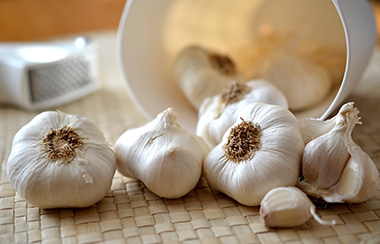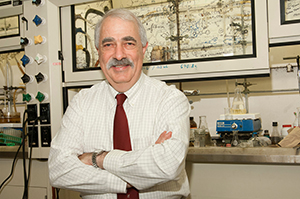Study: Garlic and Fluorine Combination Shows Promise as Drug Therapy
 |
|
Could the combination of garlic and fluorine be the future of drug therapeutics? |
ALBANY, N.Y. — There’s a lot more to garlic than its distinctive odor and strong, pungent taste.
For centuries, the allium root vegetable has been used as a natural medicine. Athletes at the first Olympics in ancient Greece ate it to enhance their strength and stamina. During World War I and II, soldiers were given garlic to prevent gangrene. More recently, scientists have found that compounds in garlic serve as a natural antibiotic to prevent and fight various diseases and illnesses.
Garlic Fluorination
In a new study, Eric Block, a distinguished professor of chemistry at the University at Albany, along with Shaker A. Mousa, vice provost for research at Albany College of Pharmacy and Health Sciences, and seven of their colleagues looked at whether adding the chemical element fluorine into natural garlic-derived compounds would enhance beneficial biological activity.
Fluorine is one of the most reactive elements in the periodic table and widely used in the pharmaceutical industry. For example, several of the top 10 best-selling drugs contain fluorine atoms, including Pfizer’s cholesterol-lowering agent Lipitor and Prevacid, a medication used to treat and prevent stomach and intestinal ulcers.
The scientists hypothesized that garlic and fluorine could prove to be a powerful combination.
“Since its discovery, the antibiotic properties found in garlic compounds have been the subject of extensive research,” Block said. “Given the great importance of fluorine in medicinal chemistry and chemical biology, we were interested in observing the effect that fluorine substitution would have on the chemical reactivity and biological activity of garlic compounds. Such fluorinated analogs were presently unknown."
 |
|
Eric Block, distinguished professor of chemistry. |
To test their hypothesis, the scientists modified several garlic compounds, replacing hydrogen atoms with fluorine atoms. Once completed, they used 10-day-old chick embryo eggs to compare the effectiveness of the fluorine-modified compounds and unmodified compounds as anti-angiogenesis and antithrombotic agents. Anti-angiogenesis agents are used to fight against cancer by blocking tumor growth, while antithrombotic agents help reduce the formation of blood clots.
Results showed the modified compounds were superior in biological activity and should be considered in the development of future drug therapies.
“Our results show evidence that new pharmaceuticals can involve modifying naturally-formed garlic compounds to enhance their beneficial biological activity,” Block said. “This paper represented a pilot study. Future work requires modifying the laboratory procedures to make the new compounds discovered more readily available, and at a lower cost, to facilitate more detailed laboratory, biological and, potentially, clinical study.”
You can read the full findings from this study in the November 2017 edition of Molecules.
Local Connection:
The Capital Region’s connection to garlic-based research dates back to 1944 when chemist Chester Cavallito was the first to isolate the garlic compound allicin and identify its antibacterial properties. Cavallito was a research group leader at Sterling-Winthrop Research Institute in Rensselaer, N.Y., and is still viewed by many as the “father of garlic chemistry.”
Block has continued Cavallito’s legacy in the region, devoting the past half-century to the field of organosulfur chemistry. His research discoveries have received national media attention, including an article in the New York Times, titled: “The Chemical Weapons of Onions and Garlic,” and appearance on NPR Radio, where he explained why onions make us cry.
Block joined the UAlbany faculty 36 years ago. He is the author of more than 250 scientific papers, five books, and 10 patents in the field of organic chemistry, and has been continuously funded by the National Science Foundation (NSF) since 1980.
He is retiring from teaching at the end of this semester. However, his allium research passion will continue.
“I will spend 2018 as a visiting scholar in the chemistry department at UCLA,” Block said. “While in California, I will continue to write and lecture about my research interests in the chemistry of garlic and other alliums, the chemistry of smell, as well as the field of organosulfur chemistry.”
You can learn more about Block’s research and expertise here.
![]() For more news, subscribe to UAlbany's RSS headline feeds
For more news, subscribe to UAlbany's RSS headline feeds
A comprehensive public research university, the University at Albany-SUNY offers more than 120 undergraduate majors and minors and 125 master's, doctoral and graduate certificate programs. UAlbany is a leader among all New York State colleges and universities in such diverse fields as atmospheric and environmental sciences, business, education, public health,health sciences, criminal justice, emergency preparedness, engineering and applied sciences, informatics, public administration, social welfare and sociology, taught by an extensive roster of faculty experts. It also offers expanded academic and research opportunities for students through an affiliation with Albany Law School. With a curriculum enhanced by 600 study-abroad opportunities, UAlbany launches great careers.


